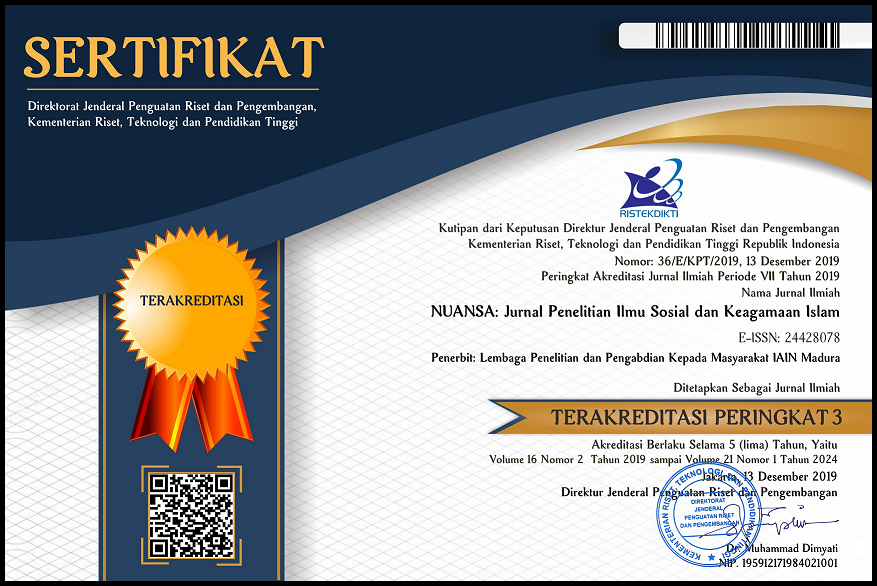UPAYA MENEKAN PERILAKU FANDALISME SISWA DI LEMBAGA PENDIDIKAN ISLAM (Studi Kasus di MTs Negeri Kadur Pamekasan)
 Abstract views: 203
,
Abstract views: 203
,
 PDF downloads: 128
PDF downloads: 128
Abstract
One of the factors making students’ failure in learning is students’ vandalism either inside or outside the class. In facing this case, teachers and organizer of institution need certain wise approach. This article focuses on, first, how are the students vandalism images at MTs Negeri Kadur Pamekasan, and second, what are the efforts to push down the students vandalism images at MTs Negeri Kadur Pamekasan. The results showed that the images of students’ vandalism at MTs Negeri Kadur Pamekasan were: coming late into the class, not wearing uniform, not attending the class, not doing the homework, going out with close friend, being lazy in studying, smoking, colouring the hair, bringing mobile phone, going out of the school without permission, stealing and wearing earrings. The efforts done are using moral and emotional approach and spiritual approach.
Downloads
References
Al-Ghazali, Abu Hamid. Ihya’ Ulumuddin vol.1. Semarang: Thoha Putra Semarang, tt.
al-Jumbulati , Ali. dan Abdul Futuh al-Tuwanisi, Perbandingan Pendidikan Islam terj. Ahmad Afandi. Jakarta: Rineka Cipta, 2002.
Ash’ari, KH. Hasim. Adab al- ‘Alim wa al- Muta’allim. Jombang: Maktabat al- Turath, tt.
Bahreisj, Hussen. Ajaran-ajaran Imam Al-Ghazali. Surabaya: Al-ikhlas, 1981.
Bodgan, RC. dan S.J. Taylor, Introduction to Qualitative Research Methods: A Phenomenological Approach to the Social Sciences. New York: John Wiley and Sons. Inc. 1985.
Dimyati dan Mudjiono. Belajar dan Pembelajaran. Jakarta: Renika Cipta, 1999.
Gorton, Richard A. School Administration: Challenge and Opurtunity for Leandership. USA:Brown Company Publishers, 1976.
Kartono, Kartini. Pengantar Metodoloi Riset Sosial. Bandung: Mandar Maju, 1996.
Majid, Nurcholis. “Peran Pendidikan Agama Bagi Pertemuan Anak Saleh:” dalam Pendidikan Agama dan Akhlak. Jakarta: Logos Wacana Ilmu, tt.
Moleong, Lexy J. Metodologi Penelitian Kualitatif. Bandung: PT. Remaja Rosda Karya, 2006.
Muhaimin dan Abdul Mujib. Pemikiran Pendidikan Islam: Kajian Filosofis dan Kerangka Dasar Oprasionalisasinya. Bandung: Tri Genda Karya, 1993.
Nasution, S. Metode Penelitian Naturalistik-Kualititif. Bandung: Tarsito, 1992.
Nata, Abuddin. Manajemen Pendidikan: Mengatasi Kelemahan Pendidikan Islam Di Indonesia. Jakarta: Prenada Kencana, 2003.
Nata, Abudin. Filsafat Pendidikan Islam. Jakarta: Logos Wacana Ilmu, 1997.
Nawawi, H. Hadari. Penelitian Terapan. Yogyakarta: UGM University Press,1994.
Priyanto dan Ermananti, Dasar-Dasar Bimbingan dan Konseling. Jakarta: Renika Cipta, 1998.
Rachman, Arif. ”Bentuk Penyimpangan Sikap Kenakalan Anak Didik” dalam Pendidikan Agama dan Akhlak. Jakarta:Logos Wacana Ilmu, 2002.
Subroto, Suryo. Proses Belajar Mengajar di Sekolah. Jakarta: Renika Cipta, 1997.
Sudjana, Nana dan Ibrahim. Penelitian dan Penilaian Pendidikan. Bandung: Sinar Baru Algesindo, 2009.
Sulaiman, Fathiyah Hasan. Sistem Pendidikan Al-Ghazali, terj. Fathurrahman. Bandung: al-Ma’arif, 1986.
Syah, Muhibbin. Psikologi Belajar. Jakarta: Raja Grafindo Persada, 2003.
Tilaar, H.A.R. Manajemen Pendidikan Nasional. Bandung: Remaja Rosda Karya, 1992.
Tim Penerjemah Al-Qur’an Departemen Agama RI, Al-Qur’an dan Terjemahannya.
Undang-Undang RI no 20 tahun 2003 tentang Sistem Pendidikan Nasional.
Peraturan Pemerintah no 27, 28, 29, dan 30 tahun 1990.
al-Bukhary, Sahih Bukhary: Kitab al-Nikah no. CD Hadith 4832
Hanbal, Ahmad Ibnu Musnad Ibn Hanbal no CD Hadith 2719.
The journal operates an Open Access policy under a Creative Commons Attribution-NonCommercial 4.0 International License (CC-BY-NC) 
Authors who publish with this journal agree to the following terms:
- Authors retain copyright and grant the journal right of first publication with the work simultaneously licensed under a Creative Commons Attribution License that allows others to share the work with an acknowledgement of the work's authorship and initial publication in this journal.
- Authors are able to enter into separate, additional contractual arrangements for the non-exclusive distribution of the journal's published version of the work (e.g., post it to an institutional repository or publish it in a book), with an acknowledgement of its initial publication in this journal.
- Authors are permitted and encouraged to post their work online (e.g., in institutional repositories or on their website) prior to and during the submission process, as it can lead to productive exchanges, as well as earlier and greater citation of published work.






















